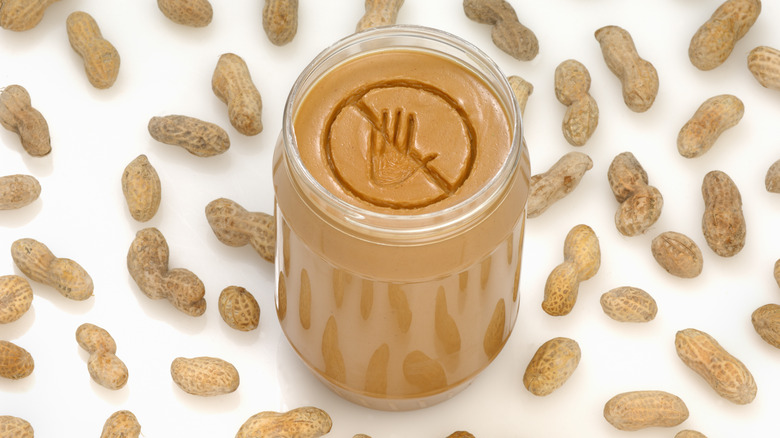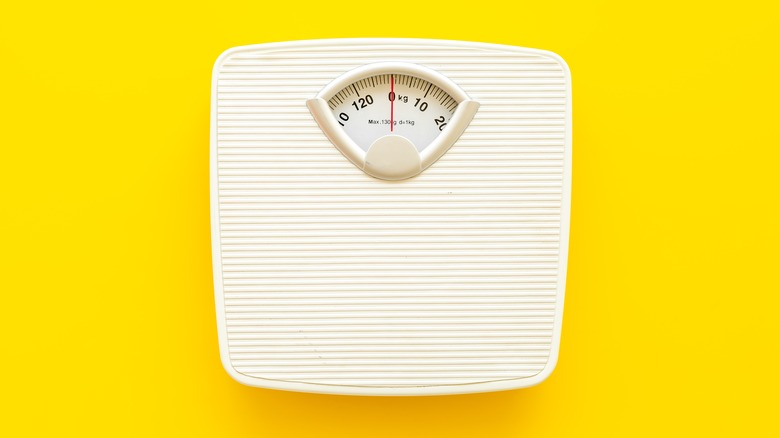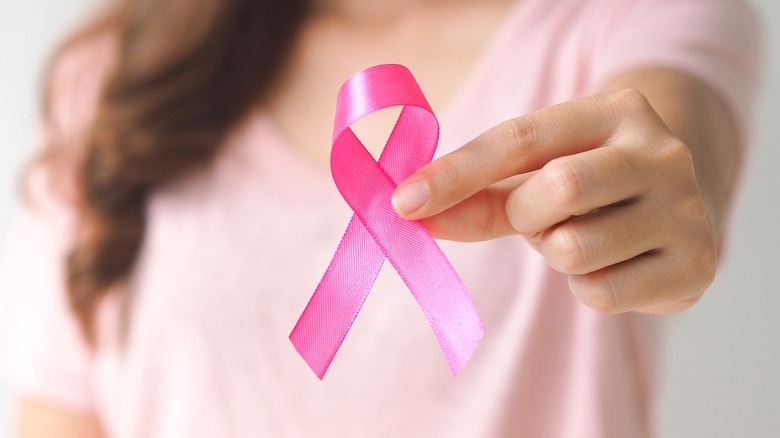Eating Peanut Butter Can Help Prevent These Common Diseases
Peanut butter's popularity really exploded at the beginning of the 1900s (per History.com). A farmer named C.H. Sumner sold a variety of nut butters at the 1904 World's Fair. (While peanuts are technically legumes, they are often thought of as members of the nut family).
A big selling point of Sumner's nut butters was how they're packed with protein. This appealed to anyone who was looking for alternatives to meat or had difficulty chewing meat. Sumner, who was the only person at the fair selling peanut butter, reportedly made a little over $700. In 1905, the first nationwide brand of peanut butter hit the shelves. Fast forward two years, and American peanut butter production was up to 34 million pounds. Quite a jump, considering it was two million pounds in 1899.
While we will be exploring some of the reasons why peanut butter might help reduce the risk of certain diseases, it's important to not overindulge in it. As registered dietitian nutritionist Frances Largeman-Roth told TODAY, while it's all right to eat peanut butter as often as every day, one should not exceed the serving of basically two tablespoons. Largeman-Roth also notes that ingredients can vary, so it's important to check the label before choosing a brand of peanut butter. And, of course, it would be wise to check with a healthcare professional before adding (or adding more of) any food to your diet.
Do you have a peanut allergy?
You might look at the above question and think, "No, I've eaten peanuts for years." But according to the American College of Allergy, Asthma, & Immunology, it's possible to develop a food allergy at any point in your life. So, even if you've eaten peanuts and foods that contain or are made from peanuts for years, that doesn't mean you can't become allergic to peanuts during adulthood.
In addition, there are different symptoms of a peanut allergy (via Mayo Clinic). The one usually focused on (and for good reason, considering it's life-threatening) is anaphylaxis, which has its own range of symptoms, like one's pulse increasing, blood pressure dropping severely, and throat becoming swollen to the point that it makes breathing more difficult. Other symptoms of anaphylaxis can include the airways becoming constricted, lightheadedness, and dizziness. In addition, the person could lose consciousness. However, a peanut allergy can also cause symptoms that include a runny nose, itchiness around or inside the mouth and throat, hives, stomach cramps, diarrhea, nausea, and/or vomiting. But no matter what symptom or symptoms someone is experiencing, it's important to seek immediate medical help.
If you think you might have a peanut allergy, a medical professional can perform a skin test and a blood test to help determine if you have an allergy. Typically, you'll also be asked about your medical history. You might also be asked to keep a food diary and do an elimination diet.
Type 2 diabetes
According to the World Health Organization (WHO), if a person has diabetes, then they have a chronic disease. There are different types of diabetes, including type 2, which involves the cells of the body becoming resistant to insulin. When this occurs, blood sugar levels can become elevated and cause damage since insulin is needed for the cells of the body to use glucose.
However, Dr. Walter C. Willett, professor of nutrition at the Harvard School of Public Health, notes, "Over the years, numerous studies have shown that people who regularly include nuts or peanut butter in their diets are less likely to develop heart disease or type 2 diabetes than those who rarely eat nuts." As Medical News Today explains, when blood sugar (and in turn insulin) levels spike and crash, that can raise the chances of a person eventually becoming a type 2 diabetic. But natural peanut butter is a food with a low glycemic index, meaning it doesn't cause blood sugar to spike and crash. Keep in mind, though, that some peanut butters have added sugars.
Additionally, avoiding both sugar and saturated fat can help lower the chances of developing type 2 diabetes. Dr. Willett notes to Harvard that one serving of peanut butter has 3.3 grams of saturated fat and that roughly 80% of that same amount of peanut butter is unsaturated fat. Consider, too, that different brands of peanut butter can vary in their fat content.
Obesity
Certain weights are considered healthy for people with certain heights. But if a person's weight exceeds what is considered healthy for their height, that person has what the CDC refers to as a "complex" disease known as obesity. And while peanut butter might help with weight loss, it can also contribute to weight gain (per MedicineNet).
The protein in peanut butter can help one feel more satiated. In fact, experts recommend incorporating peanut butter not only into snacks, but also into meals when someone is on a diet that involves cutting calories. Think of it this way: Dieting can involve eating less, and if what you're eating isn't satisfying enough, it can be hard to stay on the diet. This, in turn, can increase the chances of giving up on a diet and experiencing weight gain. But if the food you're eating is satisfying, then the diet becomes more doable, and weight loss becomes a more attainable goal.
While peanut butter can help with weight loss, it's also packed with calories, which could cause one to gain weight, especially if other foods in their diet are also high in calories. This is why meal planning (which includes eating the right amounts of food) is especially important. Also, certain brands of peanut butter can have added sugars, so make sure to compare and contrast their ingredients before making your choice.
Alzheimer's disease
The earliest sign of Alzheimer's disease tends to be mild memory loss (via CDC). From there, symptoms can worsen to the point where the individual has difficulty with everyday activities. However, there have been findings about certain foods potentially helping lower the risk of Alzheimer's.
According to Healthcare Associates of Texas, the B vitamins, vitamin E, magnesium, and healthy fats in peanuts might be beneficial for brain health. Also, Frank Sacks, professor of cardiovascular disease prevention at Harvard T.H. Chan School of Public Health, told the Times Free Press, "People who eat peanuts regularly have a lower risk of heart disease; and there is growing evidence that the risk of developing Alzheimer's disease is associated with risk of cardiovascular disease." Sacks also said that peanuts are included in a study he leads called the MIND Trial. Also known as the MIND study or MIND Diet Trial, this 3-year research study's focus is on diet's impact on cognition decline and brain health. Specifically, the study compares the Mediterranean and DASH diet plans to determine if a combination of the two might be beneficial for brain health in older adults.
Lastly, sweets, as well as foods that are high in calories and/or contain saturated fatty acids, could be risk factors when it comes to Alzheimer's. So, eating the right amount of peanut butter and choosing one with the healthiest ingredients is important.
Heart disease
As Dr. Walter C. Willett notes, there have been studies supporting the notion that peanut butter might be beneficial for heart health. According to WebMD, some research concluded that copper (which is in peanut butter) might help lower one's heart disease risk.
Additionally, the amino acid arginine (or L-arginine), which is found in peanut butter, could help prevent heart disease. Per the Mayo Clinic, L-arginine can be given as an oral supplement to help patients with heart conditions. Plus, peanut butter contains a type of fat called oleic acid. Opting for oleic acid instead of other types of fats has been shown to help with blood sugar, blood pressure, and cholesterol levels, all of which can be factors when it comes to developing heart disease. However, a study in the Journal of Clinical Lipidology points out that while research has found evidence that dietary oleic acid might help reduce the chances of cardiovascular disease, the subject remains controversial.
The omega-6 fatty acid in peanut butter might help with cholesterol, which could impact whether someone develops heart disease. But WebMD states that consuming too much peanut oil could make one more likely to have heart disease because of its omega-6 content. So, again, the amount of peanut butter you eat matters.
Osteoporosis
According to the Cleveland Clinic, osteoporosis typically causes the bones to lose density and become thinner. This makes them weaker and more prone to fractures. Peanut butter, however, has some qualities that might help keep one's bones strong.
Per Mount Sinai, there is research suggesting that the potassium in peanut butter might help lower the chances of bone loss. Moreover, the copper in peanut butter might make one less likely to develop osteoporosis, as it helps the body create collagen (via Mount Sinai). Collagen is the primary component of our bones; in fact, 90% of the collagen in your body is of the Type 1 kind, which is crucial not only for the structure of your bones, but also for your ligaments, tendons, and skin. But consuming too much sugar and refined carbs can lower collagen levels, so it's important to check the ingredient list on your preferred peanut butter before adding it to your diet.
In addition, peanut butter contains calcium, which can also be good for bone health. However, almond butter is higher in calcium than peanut butter. Thus, swapping out peanut butter for almond butter can also reduce one's risk of developing osteoporosis.
What about cancer?
According to the National Cancer Institute, our cells naturally multiply, but damaged or abnormal cells sometimes begin multiplying when they're not supposed to. This can lead to tumors, which can either be benign or cancerous.
Peanuts have B vitamins, vitamin E, manganese, and antioxidants, all of which can be beneficial for one's cells and potentially help lower the chances of developing cancer. Furthermore, research involving more than 9,000 girls ranging in age from 9 to 15 found a possible correlation between peanut butter consumption and a reduced risk of breast cancer. Conducted by the Washington University School of Medicine in St. Louis, Missouri, the study found that the participants who consumed either peanut butter or nuts twice a week were almost 40% less likely to have benign breast disease by age 30. This was in comparison to other participants in the study who never consumed either peanut butter or nuts. Since benign breast disease raises the odds of developing breast cancer, the girls who ate nuts and peanut butter regularly in this study might also be less likely to eventually have breast cancer.
With that said, eating peanut butter solely for cancer prevention may not be the best move. A different study that focused on the nut and peanut butter consumption of more than 120,000 men and women ranging in age from 55 to 69 concluded that eating peanut butter or nuts may not necessarily lower the chances of developing cancer in both men and women.








